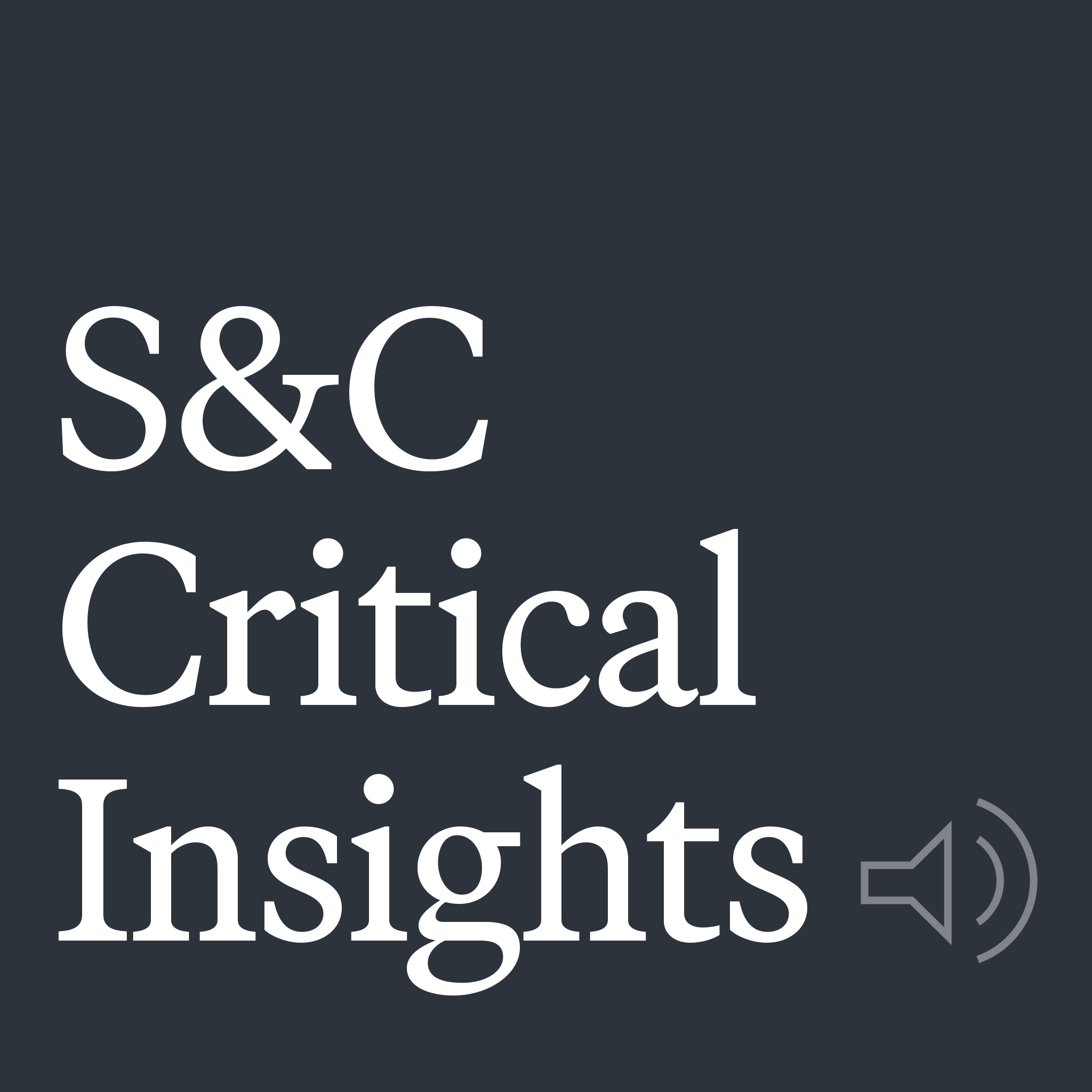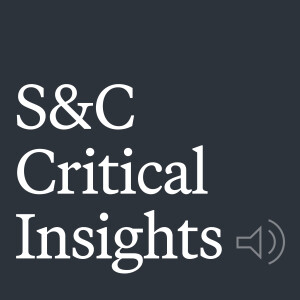
82.1K
Downloads
229
Episodes
Sullivan & Cromwell present the S&C Critical Insights podcast. Topics include M&A trends across industries, corporate governance including shareholder activism, litigation, arbitration, products liability, and more.
Sullivan & Cromwell present the S&C Critical Insights podcast. Topics include M&A trends across industries, corporate governance including shareholder activism, litigation, arbitration, products liability, and more.
Episodes

Wednesday Jun 07, 2023
Supreme Court’s Recent Slack Technologies Decision
Wednesday Jun 07, 2023
Wednesday Jun 07, 2023
In this episode of S&C’s Critical Insights, Jeff Scott and Julia Malkina, Co-Leads of S&C’s Securities Litigation Practice, discuss the Supreme Court’s June 1 decision in Slack Technologies v. Pirani and the potential implications for securities litigation.
Slack Technologies went public through a direct listing, which allows existing shareholders to sell their unregistered securities on the first day of public trading at the same time as the company’s registered shares are sold. Slack claimed that the plaintiff in this case lacked standing to sue because he could not trace the purchase of his Slack shares to the registration statement.
The issue before the Court was whether Section 11 of the Securities Act of 1933 requires plaintiffs to plead and prove that they purchased securities registered under the registration statement they allege is materially false or misleading. In a win for defendants, the Supreme Court unanimously held that the plaintiffs must plead and prove these facts, reversing the U.S. Court of Appeals for the Ninth Circuit.
Jeff and Julia discuss how the ruling reaffirms the longstanding interpretation of Section 11 and note that the Court’s decision could encourage more companies to go public through a direct listing. The ruling might also encourage legislative efforts to improve tracking of the ownership and registration of securities, including through the use of blockchain technology.

Thursday May 25, 2023
U.S. Clean Energy Tax Credits: Where We Are and Where We Are Going
Thursday May 25, 2023
Thursday May 25, 2023
In this episode of S&C’s Critical Insights, Inosi Nyatta, Isaac Wheeler and Sam Saunders discuss the unanswered questions about requirements and qualifications for receiving tax credits for clean energy projects under the Inflation Reduction Act (IRA).
The IRA, which was passed in August 2022, is the largest investment in clean energy in U.S. history and is expected to unleash a new wave of energy transition projects across the United States. It introduced new or enhanced credits for renewable energy, clean electricity investment and production, energy storage, clean hydrogen, electric vehicles, clean technology manufacturing, sustainable fuels and carbon capture.
While the IRA has opened up numerous opportunities for energy transition projects, there are still a number of uncertainties, including final rules on direct pay and transferability, the potential impact of the OECD’s Pillar Two rules and how debt ceiling discussions may impact availability of IRA tax credits.

Thursday May 25, 2023
Pharmaceutical Deal Outlook: U.S. and European Perspectives
Thursday May 25, 2023
Thursday May 25, 2023
In the webinar “Pharmaceutical Deal Outlook: U.S. and European Perspectives,” Frank Aquila, Matt Hurd, Carsten Berrar, Olivier de Vilmorin and Jeremy Kutner discuss the outlook for M&A deals in the sector. The group of partners, who came together from S&C’s New York, Frankfurt, Paris and London offices, focus in particular on outlining how patent law impacts the tenor of mergers and acquisitions, how the regulatory landscape in both the United States and Europe is affecting dealmaking, and the different considerations for acquirers as opposed to sellers.

Wednesday May 03, 2023
Wednesday May 03, 2023
In this episode of S&C’s Critical Insights, Juan Rodriguez, Co-Head of S&C’s European Competition Group and the Firm’s Antitrust Group, and associate Marielena Doeding discuss the European Court of Justice’s ruling in the Fiat case and its implication for future state aid investigations. This landmark judgment—in which the Court of Justice annulled a General Court judgment and European Commission decision –clarified the parameters under which the Commission may investigate individual tax rulings under state aid rules. Although the judgment reaffirms that the Commission may investigate tax measures for compliance with state aid rules, in doing so, it cannot apply its own version of the arm’s length principle to tax measures; in particular, it cannot apply the arm’s length principle to tax measures in jurisdictions unless – and then only to the extent that – the law of the jurisdiction incorporates that principle. Instead, the Commission must carefully consider national tax rules to assess whether or not a measure confers a selective advantage for state aid purposes.
Sullivan & Cromwell represented Fiat in this litigation.

Tuesday Apr 25, 2023
The Impact of COVID-19 on Consumer and Retail M&A
Tuesday Apr 25, 2023
Tuesday Apr 25, 2023
In this episode of S&C’s Critical Insights, partners Audra Cohen, Frank Aquila and Melissa Sawyer share important updates for dealmakers in the consumer and retail sector following the COVID-19 pandemic. Frank and Melissa discuss the impact of support legislation on various business models and explore how a continued shift in consumer priorities and product availability might change fundamental aspects of future M&A in these industries.

Monday Apr 24, 2023
M&A and Deal-Making Implications of the FCPA Resource Guide, Second Edition
Monday Apr 24, 2023
Monday Apr 24, 2023
In this episode of S&C’s Critical Insights series, Sergio Galvis, head of the Firm’s Latin America practice, outlines best practices for companies making cross-border acquisitions in view of updates to the FCPA Resource Guide issued by the U.S. Department of Justice and the Securities and Exchange Commission. With increased cooperation by regulators and law enforcement authorities across jurisdictions leading to more enforcement actions, acquirers should reevaluate their due diligence and compliance programs under these guidelines. Sergio addresses topics including: • designing and implementing an effective risk-based due diligence program for M&A, • the benefits of voluntary disclosure to the authorities of potential corruption issues, • the implementation of an effective compliance program, and • the importance of integration and remediation under the guidelines.

Monday Apr 24, 2023
French Financial Authority Proposes New Measures for Shareholder Activism
Monday Apr 24, 2023
Monday Apr 24, 2023
In this episode of S&C’s Critical Insights podcast series, Olivier de Vilmorin, head of the Firm’s European M&A practice, discusses the measures proposed by France’s securities regulator, the Autorité des marchés financiers (the “AMF”), concerning shareholder activism. Following a growing number of activist campaigns in France over the past several months, the AMF has clarified its position with pragmatic and constructive proposals to better control excessive behavior in shareholder activism campaigns, without preventing them. Olivier explores how these proposals will improve transparency and dialogue between shareholders and issuers and also strengthen AMF’s response capabilities during activist campaigns.

Monday Apr 24, 2023
Fiduciary Duty Conversations During COVID-19: Ways to Save a Business
Monday Apr 24, 2023
Monday Apr 24, 2023
S&C partners Jim Bromley and Andy Dietderich, the co-heads of our Global Restructuring practice, discuss strategies for boards confronting the “zone of insolvency” during the COVID-19 crisis.

Monday Apr 24, 2023
European Capital Markets Activity During COVID-19
Monday Apr 24, 2023
Monday Apr 24, 2023
S&C partners Carsten Berrar, Krystian Czerniecki and John Horsfield-Bradbury discuss the impact of the COVID-19 crisis on capital raising in Europe, and how issuers can adjust structures to address the current situation.

Friday Apr 21, 2023
Implications of Recent U.S. and EU Critical Mineral Legislation
Friday Apr 21, 2023
Friday Apr 21, 2023
In this episode of S&C’s Critical Insights, Inosi Nyatta, Craig Jones and Sam Saunders discuss new and proposed regulations involving critical minerals in the United States and European Union. Critical minerals, referred to as critical raw materials in the EU, are generally defined to include, among others, cobalt, graphite, lithium, manganese, nickel and rare earth minerals and are key components to clean energy technologies (in particular batteries) and other high-tech products.
In the United States, the Inflation Reduction Act (IRA), which was passed in August 2022, provides an estimated $369 billion in investments in energy security and climate change programs and also creates significant tax incentives for critical minerals to be extracted, processed and/or recycled in the United States or countries that are trade partners with the U.S.
Proposed by the European Commission in March 2023, the Critical Raw Materials Act (CRMA), aims to secure the EU’s supply of critical raw materials and bolster Europe’s own extraction, processing, refining and recycling of strategic raw materials. The CRMA would create a European Critical Raw Materials Board, set EU-wide targets for annual consumption of strategic raw materials, and establish a streamlined permitting process for strategic projects. However, unlike the IRA, it does not provide any additional funding.
